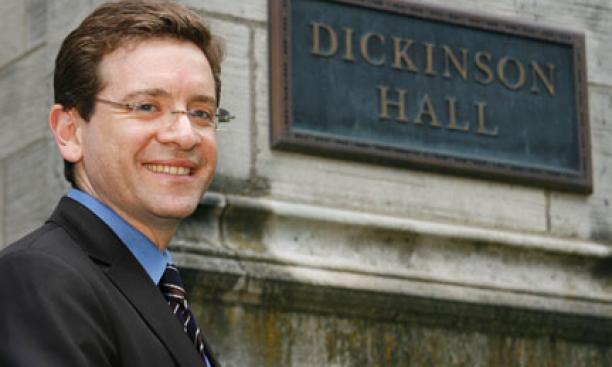

Historians are good at “seeing what’s not new,” says Julian Zelizer, a professor of history and public policy — and that’s a useful skill during a presidential election season dominated by the word “change.” Zelizer, who is quoted frequently in the popular press because of his knowledge of modern American political history, says that many of this year’s debates cover familiar themes — multilateral versus unilateral foreign policy, the role of government in the economy, and involvement in a war on foreign soil, to name a few — and the candidates bear some resemblance to their forerunners, too.
Many are calling this year’s presidential race historic because of the presence of an African-American presidential candidate and a female vice-presidential candidate. Beyond that, what makes it different from previous campaigns?
There are certain parts of the campaign that are different in terms of tactics. We have seen, in the last two election cycles, how the Internet is changing how campaigns are fought. The news cycle is even faster than it had been in cable news, and the editorial filter is almost gone at this point. Anyone can get the information out there. ... Other aspects are familiar. People seem to be disappointed that this is turning pretty partisan, with hardball campaign tactics. But we’ve been seeing this at least for decades, if not for over a century — this sort of aggressive, partisan style of character-based campaigning, tearing people down. It would be surprising if both candidates had not done this.
Do you see any historical parallels to the campaigns of Sen. Obama and Sen. McCain?
You always have to be careful when you make analogies, but you can tease out certain similarities. Jimmy Carter’s campaign in 1976 had many aspects of what Barack Obama tried to do in the primaries, not that the outcome would be the same. But the kind of maverick, focus-on-change candidacy, running outside the political establishment, using new kinds of organization, using the primary process and the caucus process very effectively — Carter did a lot of that. It’s also useful to think about what’s different. If Obama wins, will he be Carter? There are some differences that suggest maybe he wouldn’t. Carter had little friendship with Democratic congressmen, so once he was president, no one in Congress really liked him, and it was difficult to pass legislation. Today, Barack Obama is much closer to the Democratic leadership, so he may have a more successful outcome.
McCain is tapping into a tradition that’s been around since 1980: a very muscular approach to foreign policy, which has been a hallmark of Republican politics. On social issues, he is taking a kind of anti-coastal approach, but that also is rooted in 1980s politics.
How would you characterize Gov. Sarah Palin’s effect on the Republican ticket?
It was huge. Clearly in the first few weeks it changed the campaign to some degree. Certainly, it diminished Barack Obama’s momentum. It just mixed things up. It was kind of this weird, crazy pick that then threw the opposition off. Obama and David Axelrod, his campaign chairman, have run a very disciplined, focused campaign with a clear long-term strategy, and [Palin’s nomination] shook them a bit.
Can a vice-presidential candidate decide the presidential race?
In general, the person running for president is who people will vote for, and I think, in the end, that will be the case this year. But Palin, either in a negative or a positive way, might have a bigger effect on McCain’s outcome than, say, Al Gore did for Bill Clinton. It’s so unusual, it’s so unexpected, that it might have an effect. If John McCain can win because he has energized the conservative base that didn’t like him, then the vice-president pick has played a bigger role than I can think of for a long time. If he loses because of her inexperience on issues he’s good at, like foreign policy, that also will show she’s played a bigger role.
What questions in this campaign are not getting as much attention as they should?
One is money and politics. It’s phenomenal how expensive this campaign is. Two candidates are promising change and reform, yet both of them are tied to huge campaign donors. Can you really get change after this has happened? Another question that we don’t like to talk about is the fact that many Americans won’t vote in this election cycle, even with all this excitement. Traditionally, we’ve had under 50 percent of Americans voting in presidential elections. What does that say about our democracy? ... And a third issue is what’s going to happen on Election Day. In 2000, the weaknesses in the system were totally exposed — the ways in which people are excluded from voting, the amateur way in which we handle this very important event. The issue has faded since then. Here we go again, in a very close election, and I haven’t heard much from the candidates or the parties. What’s been done to make sure that everyone’s vote counts?
Interview conducted and condensed by Brett Tomlinson.
